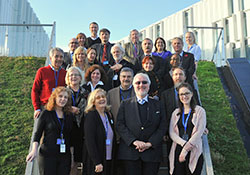Taking stock of measles and rubella elimination in the European Region

WHO
A review of national status reports by the European Regional Verification Commission for Measles and Rubella Elimination (RVC) has revealed uneven progress in interrupting endemic transmission across the Region as well as challenges at national level that require urgent action.
The RVC is an independent panel of experts tasked with determining whether endemic transmission continues or has been interrupted in each Member State based on annual updates submitted by national verification committees. Its ultimate goal is to declare the Region measles and rubella free.The RVC met for the third time on 10–12 November 2014 in Copenhagen, Denmark.
Findings
The 8-member panel evaluated 50 reports for 2013 as well as several for 2010–2012 that had been submitted after last year's meeting. The RVC was pleased to note that 50 Member States have now established national verification commissions and, as a result, more Member States had submitted timely and complete annual reports than in the previous year. Nearly half of the 53 Member States in the European Region have demonstrated interruption of endemic transmission of measles and rubella. The available data for the remaining Member States was either inconclusive or indicative of endemic transmission.
Through the annual review process a much clearer picture is emerging of where and why measles and rubella outbreaks are occurring and the effects of measures being taken to control them. Although the quality of reporting needs further improvement, increased submissions and completeness of reports has enabled the team to look more critically at disease surveillance and immunization programme performance, and therefore to make more in-depth evaluations and recommendations.
WHO/Europe and the members of the RVC stand ready to assist individual Member States as needed in the coming year to improve performance where gaps have been identified. A full report of the Commission's findings will be available on the WHO/Europe website soon.
Background
In 2010 the WHO Regional Committee for Europe established the target date of 2015 for the elimination of measles and rubella. Verification of elimination by the RVC requires that all countries in the Region provide credible evidence that they are free from endemic measles and rubella virus transmission.
To facilitate annual reporting, the Regional Committee recommended that all Member States establish a national verification committee. The RVC adopted a framework for the verification process as well as a standard reporting format now called the Annual Status Update (ASU).
Annual reports
Status reports include information on measles and rubella epidemiology, virologic surveillance supported by molecular epidemiology, the analysis of vaccinated population cohorts and the quality of surveillance, and the sustainability of the country's national immunization programme.
The review and evaluation of annual national reports will continue for at least 3 years after the RVC confirms that, according to established criteria, endemic measles and rubella transmission have been interrupted in all Member States of the Region. Only then can regional elimination be declared.



